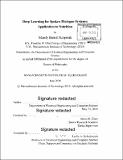Deep learning for spoken dialogue systems : application to nutrition
Author(s)
Korpusik, Mandy B.
Download1122790819-MIT.pdf (21.29Mb)
Other Contributors
Massachusetts Institute of Technology. Department of Electrical Engineering and Computer Science.
Advisor
James R. Glass.
Terms of use
Metadata
Show full item recordAbstract
Personal digital assistants such as Siri, Cortana, and Alexa must translate a user's natural language query into a semantic representation that the back-end can then use to retrieve information from relevant data sources. For example, answering a user's question about the number of calories in a food requires querying a database with nutrition facts for various foods. In this thesis, we demonstrate deep learning techniques for performing a semantic mapping from raw, unstructured, human natural language directly to a structured, relational database, without any intermediate pre-processing steps or string matching heuristics. Specifically, we show that a novel, weakly supervised convolutional neural architecture learns a shared latent space, where vector representations of natural language queries lie close to embeddings of database entries that have semantically similar meanings. The first instantiation of this technology is in the nutrition domain, with the goal of reducing the burden on individuals monitoring their food intake to support healthy eating or manage their weight. To train the models, we collected 31,712 written and 2,962 spoken meal descriptions that were weakly annotated with only information about which database foods were described in the meal, but not explicitly where they were mentioned. Our best deep learning models achieve 95.8% average semantic tagging F1 score on a held-out test set of spoken meal descriptions, and 97.1% top-5 food database recall in a fully deployed iOS application. We also observed a significant correlation between data logged by our system and that recorded during a 24-hour dietary recall conducted by expert nutritionists in a pilot study with 14 participants. Finally, we show that our approach generalizes beyond nutrition and database mapping to other tasks such as dialogue state tracking.
Description
Thesis: Ph. D., Massachusetts Institute of Technology, Department of Electrical Engineering and Computer Science, 2019 Cataloged from PDF version of thesis. Includes bibliographical references (pages 207-221).
Date issued
2019Department
Massachusetts Institute of Technology. Department of Electrical Engineering and Computer SciencePublisher
Massachusetts Institute of Technology
Keywords
Electrical Engineering and Computer Science.